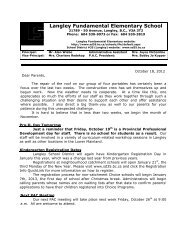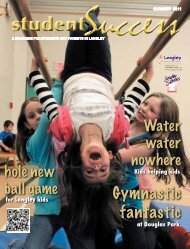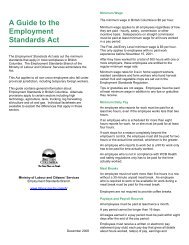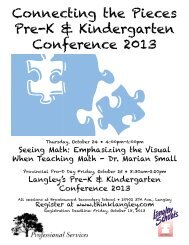A magazine for students and parents in langley - School District #35
A magazine for students and parents in langley - School District #35
A magazine for students and parents in langley - School District #35
- No tags were found...
Create successful ePaper yourself
Turn your PDF publications into a flip-book with our unique Google optimized e-Paper software.
“Vulnerability has <strong>in</strong>creased over time,” Ms. Beaumont noted.“No neighbourhoods have had consistent decreases over time.”While Langley is <strong>in</strong> the mid-range when it comes to the overallvulnerability of its newest <strong>students</strong>, accord<strong>in</strong>g to HELP,there is still reason <strong>for</strong> concern. HELP Director Dr. ClydeHertzman said <strong>in</strong>creased vulnerability is a predictor of an arrayof problems <strong>for</strong> children through their school years <strong>and</strong>beyond.He says there is a grow<strong>in</strong>g body of research that shows theearly developmental years are critical <strong>in</strong> ways we have neverunderstood be<strong>for</strong>e, <strong>and</strong> that <strong>parents</strong> need to be aware of theearly childhood ‘w<strong>in</strong>dow of opportunity’, that can have lifelongbenefits <strong>for</strong> children.Dr. Hertzman characterizes the years from <strong>in</strong>fancy to threeyears old, <strong>and</strong> then to five years old, as foundational. If th<strong>in</strong>gsare not done right, it will be very difficult to set them straightlater on.Speak<strong>in</strong>g to the Prov<strong>in</strong>ce newspaper, he said “…when th<strong>in</strong>gswork out to beg<strong>in</strong> with, it’s way easier <strong>for</strong> kids to grow <strong>and</strong>develop. It’s like leaky condos – if it isn’t built right from thebeg<strong>in</strong>n<strong>in</strong>g, it will be way harder <strong>and</strong> expensive to fix later.”Early experiences <strong>in</strong> life <strong>in</strong>fluence the <strong>for</strong>mation of the bra<strong>in</strong>.Children who do not experience love <strong>and</strong> affection ‘close up’at an early age are more likely to f<strong>in</strong>d it difficult to connectwith others later <strong>in</strong> life.If they are brought up <strong>in</strong> environments where there are frequentoutbursts of anger or depression, children will developlifelong predispositions to be anxious <strong>and</strong> overly vigilant.“They adapt <strong>for</strong> their environment, but they don’t adapt <strong>for</strong>success at school,” Hertzman said, not<strong>in</strong>g that the adaptationis not only behavioural, it is neurological.Vulnerable children are neurologically different from theirpeers, <strong>and</strong> those differences will likely affect them throughouttheir lives.Children who are read to from an early age get a double positivedose consist<strong>in</strong>g of enrich<strong>in</strong>g vocabulary plus quality timewith Mom <strong>and</strong> Dad, which Hertzman calls a ‘bra<strong>in</strong> booster’.The long-term positive effects of read<strong>in</strong>g beg<strong>in</strong> to show from20 to 24 months, <strong>and</strong> last a lifetime.Conversely children who beg<strong>in</strong> school with a language deficitmay struggle throughout their school years <strong>and</strong> beyond.The <strong>in</strong>creased lifelong risks faced by vulnerable children<strong>in</strong>clude:• Second decade: school failure, teen pregnancy,crim<strong>in</strong>ality;• Third <strong>and</strong> Forth decades: obesity, elevated bloodpressure, depression;• Fifth <strong>and</strong> Sixth decades: coronary heart disease, diabetes• Old Age: premature ag<strong>in</strong>g, memory loss.In his <strong>in</strong>terview with The Prov<strong>in</strong>ce Dr. Hertzmanrecommended five th<strong>in</strong>gs <strong>parents</strong> can do toenhance the futures of their children:1. Early on <strong>in</strong> life spend as much time as possiblehold<strong>in</strong>g, touch<strong>in</strong>g <strong>and</strong> talk<strong>in</strong>g to your child.2. Get <strong>in</strong> the habit of read<strong>in</strong>g fun bedtime storiesto your child. Make it a lov<strong>in</strong>g, emotionalexperience, <strong>and</strong> ask questions as well as read.3. Provide as much time as possible <strong>for</strong> your childto play with other children <strong>and</strong> on their own.4. If you need childcare, <strong>in</strong>sist on high quality-care<strong>and</strong> environments.5. Develop a support network with neighbours<strong>and</strong> friends to help solve your family’s problemswith work-life time challenges.Children who do not experience love <strong>and</strong> affection ‘close up’ atan early age are more likely to f<strong>in</strong>d it difficult to connect withothers later <strong>in</strong> life.Flickr photo by kev<strong>in</strong>dooleyw<strong>in</strong>ter edition 17
















